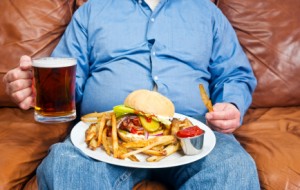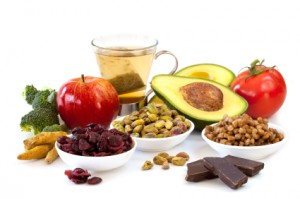For years dermatologists were adamant that diet did not influence or affect acne. However, recent scientific research suggests the link between diet and acne does exist, particularly in a Western diet. The American Journal of Clinical Nutrition published a report from researchers who believe it isn’t the particular food you eat, like pizza or chocolate, that triggers acne, but the typical Western diet itself.

Research by Australian scientists at the RMIT University and Royal Melbourne Hospital Department of Dermatology, who discovered the link between diet and acne, found it related directly to the changes in glucose and insulin levels brought about by certain foods which affected and influenced skin changes.
They discovered that foods with a high glycaemic index, typical of those consumed in a Western diet, caused a sharp rise in glucose and insulin levels, and were more likely to influence the development and severity of acne. Protein and low glycaemic carbohydrates were seen to lessen the effects of acne, and the study has prompted more research.
Although there is no official advice about diet and acne yet, healthy eating will always certainly improve your health. The general guidelines of eating a minimum of five portions of fruit and vegetables a day, drinking plenty of water and reducing foods high in saturated fat and salt are recommended for everyone, not just for those with acne.
Eating healthily will help to improve good skin, so it has to be beneficial to make some simple dietary changes to help bring about some positive results. And while your diet may not cause your acne, if you are predisposed to acne your diet is much more likely to aggravate or trigger it.
Foods that may trigger acne
Certain foods are thought to be more acne-inducing than others.
Simple carbohydrates
These foods form the basis of much of the Western diet and are considered major contributors to the growing obesity problem. Pizza bases, white bread, refined flour, cakes, pastries, white rice and pasta are all part of many Westerners’ staple diet. High in refined carbohydrates, such foods raise the blood sugar rapidly, releasing glucose for energy, and are rated as high glycaemic foods.
The glycaemic index (GI) measure the rate or speed at which individual foods are digested and this depends upon the amount of carbohydrates, protein, fats and fibre they contain. It is the carbohydrates component which affects blood sugar levels, with low GI foods raising blood sugar levels slowly and high GI foods raising blood sugar levels rapidly.
Rapid rises and falls in blood sugar levels affect energy and cause cravings, which can lead to overeating and weight gain. High GI foods increase levels of insulin, and an insulin-like growth factor, IGF-1, increases the production of the male hormone testosterone. This in turn stimulates the overproduction of sebum, inflammation and acne.
Eating mostly low GI foods will ensure you are left feeling full and will help to control surges in blood sugar, reducing possible acne lesions.
Foods to eat include whole grains, lentils, fruit, brown rice, potatoes and root vegetables, while foods to avoid include refined and processed foods, fried foods, biscuits, cakes, pastries and fizzy drinks.
Milk
Milk is thought to affect and aggravate acne, particularly in women, because of the natural and synthetic hormones it contains. The hormones naturally produced by the cow include DHT, a by-product of testosterone, found naturally in teenagers, and the IGF-1 hormone.
Saturated fats common in dairy products are also thought to initiate acne, and are linked to several other health conditions including hardening of the arteries, heart disease, stroke, diabetes and certain cancers. These fats are also thought to increase bacteria, a precursor to acne.
Although there is still little scientific evidence, some nutritionists suggest milk and dairy products should be removed from the diet if you have or are acne prone to acne, a theory that is supported by an American dermatologist, Nicholas Perricone.
Meat
Red meat is known to contain artificial hormones and steroids, and there is concern that these may upset the natural hormonal balance within the body. An acidic food, meat can sometimes be difficult to digest and creates toxins, a by-product of acid forming food, which can often end up for prolonged periods in the digestive system. Constipation is often linked to skin problems, so good digestion is important.
Caffeine
Caffeine increases the levels of stress hormones in the body, and it is thought to stimulate sebum production. Caffeine can be found in cola, chocolate and fizzy drinks, as well as coffee.
Foods considered beneficial for acne
 The healthiest foods to eat for your skin include fruit, vegetables, nuts and seeds, as they are full of all the necessary vitamins and minerals you need. These foods help the skin regenerate while at the same time protecting if from free radicals – harmful molecules in the air – and radiation from ultraviolet rays.
The healthiest foods to eat for your skin include fruit, vegetables, nuts and seeds, as they are full of all the necessary vitamins and minerals you need. These foods help the skin regenerate while at the same time protecting if from free radicals – harmful molecules in the air – and radiation from ultraviolet rays.
Vitamins
Vitamins may be small but they are vital for performing specific functions that are essential for maintaining health. Research has discovered that people with acne tend to have lower levels of vitamins A and E than normal. Healthy skin requires the vitamins A, C and E in particular. The best way to ensure you have a good supply of vitamins is by eating at least five portions of fruit and vegetables each day.
Vitamin A
This vitamin is also known as retinol, and is one of the most important vitamins for healthy skin and hormonal balance. Vitamin A reduces the production of sebum and is very often found in conventional acne treatments; Retinol-A cream or gel, for example, contains tretinoin, a form of vitamin A.
It is also thought vitamin A may help your skin if it is scarred as a result of acne. Good food sources of this vitamin include fish oils, carrots, green leafy vegetables, and yellow and orange fruit such as peppers, mangoes and peaches. High doses of vitamin A can be toxic, so if you intend to take a vitamin supplement do not exceed the manufacturer’s recommended amounts, or consult your doctor.
IMPORTANT: doses of 25,000 IU or higher of vitamin A should only be taken under professional advice because there is evidence that adverse effects (including birth defects) may result. There are approximately 15,500 IU of vitamin A/100 g of kale and 16,812 IU/100 g of carrots.
Vitamin E
Vitamin E protects your body’s cells from free radicals, as it acts as an antioxidant and protects the immune system. Importantly, it regulates vitamin A. Low levels of vitamin A in the body produce toxic effects in the cells, and vitamin E helps to combat these effects. It is also thought to help the skin recover from acne scarring. Good food sources include vegetable oils, wheat- germ, broccoli, peanuts and sunflower seeds.
Vitamin B
There are many B vitamins and together they maintain the health and upkeep of the body’s nervous system. They have a direct correlation with stress, depression and anxiety; psychological symptoms associated with acne. These vitamins are water-soluble, so they have to be eaten every day as they cannot be stored in the body. They are also responsible for providing us with energy, which occurs during the conversion of glucose from carbohydrates. The B vitamins most important for acne include:
- Thiamine (B1)
- Riboflavin (B2)
- Niacinamide (B3)
- Pantothenic acids (B5)
- Pyridoxine (B6)
| Acne-Friendly Vitamin Foods | |
|---|---|
| Vitamin A | Carrots, sweet potatoes, 'orange' fruits, mangoes and apricots, nectarines, spinach, broccoli, red peppers, pumpkins, watercress, parsley, melons, tomatoes and red chillies |
| Vitamin B1 (thiamin) | Oranges, plums, pineapples, cauliflower, kale, garlic, mange tout, leeks, parsley, peas, spinach, bananas, dried fruit, nuts and seeds. |
| Vitamin B2 (riboflavin) | Apricots, asparagus, bananas, blackcurrants, peaches, kale, cherries, broccoli, beansprouts, red peppers, mushrooms, avocados and watercress |
| Vitamin B3 (niacin) | Grapes, grapefruit, passion fruit, beansprouts, kale, peppers, nuts and seeds, broccoli, carrots, dates, tomatoes, avocados and asparagus |
| Vitamin B5 (pantothenic acid) | Blackberries, strawberries, broccoli, watermelons, celery, tomatoes, sweet potatoes and chickpeas |
| Vitamin B6 (pyridoxine) | Blackcurrents, raspberries, watermelons, leeks, green peppers, bananas, avocados and green leafy vegetables |
| Vitamin B12 (cobalamin) | Found in animal products, such as meat and dairy, but this is not useful if you have reduced dairy products. Very often found in fortified foods such as fortified breakfast cereals. It is much more difficult to find in fruit and vegetables. |
| Folic acid | Oranges, bananas, pineapples, strawberries, beetroot, spinach, cauliflower, cabbage, broccoli, asparagus, lettuce, chickpeas and sunflower seeds |
| Biotin | Dark green leafy vegetables, dried fruits and nuts |
| Vitamin C | Blackcurrants, rose hips, guavas, redcurrants, blackberries, grapefruit, strawberries, kiwi fruit, lemons, oranges, pineapples, broccoli, tomatoes, peppers, leafy vegetables and watercress |
| Vitamin D | The main source of this vitamin is sunlight. It is necessary for the absorption of calcium for bones and teeth and is found in minute amounts in oily fish, sunflower seeds, mushrooms and cod liver oil |
| Vitamin E | Avocados, sweet potatoes, celery, cabbage, watercress, spinach, tofu, nuts and seeds, olives and olive oil |
| Vitamin K | Brussels sprouts, cabbage, asparagus, spinach, parsley, avocados and kiwi fruit |
Minerals
Just like vitamins, minerals are essential for a healthy body and skin. Their major functions include converting food into energy, controlling body fluids, and promoting the development of bones and teeth.
They are required in small or minute quantities. Calcium, iron, magnesium, phosphorus, potassium, sodium and sulphur are all found in different food groups, and the trace elements, of which you only need minute amounts, include boron, cobalt, copper, chromium, fluoride, iodine, manganese, selenium, silicon and zinc.
Zinc is thought to play a particularly beneficial role in acne as it transports vitamin A around the body, aids wound healing and inflammation, and is essential for the health of the skin. Zinc is involved in the metabolism of testosterone; a lack of zinc increases the production of testosterone, the precursor of acne.
Research has shown zinc to be helpful for up to 60 per cent of those with acne. It can be taken in tablet or cream form, but remember to check if your medication already includes it as it is used with erythromycin, an antibacterial that is available in gel or solution form.
Selenium is another useful mineral. A powerful antioxidant, it protects the skin from harmful free radicals, such as environmental pollution, and radiation from ultraviolet light. Working with vitamins A, C and E, this trace element helps to preserve the skin’s elasticity.
| Food Sources for Minerals | |
|---|---|
| Sulphur | Onions, raspberries, nuts, cabbage, leafy green vegetables, fish, sweet potatoes, watercress, radishes |
| Selenium | Garlic, mushrooms, asparagus, lentils, oats, brown rice, brazil nuts, seaweed, avocados, sunflower seeds |
| Chromium | Brewer's yeast, molasses, wheat bran, whole grains |
| Zinc | Guavas, raspberries, root vegetables, Brussels sprouts, tomatoes, nuts, pumpkin and sunflower seeds, eggs, seafood, poultry, fortified cereals |
| Calcium | Kelp, watercress, seeds, sprouted grains, blackberries, raspberries, carrots, kale, celery, dried figs |
| Iron | Green leafy vegetables, poultry, dried fruits, prunes, blackcurrants, passion fruit, nuts |
| Magnesium | Seafood, apples, melons, beetroot, peas, spinach, tomatoes, soya, brown rice, figs, strawberries, bananas, peanut butter, potatoes |
| Phosphorus | Grapes, sesame seeds, fish, lentils, kiwi fruit, parsnips, broccoli |
| Potassium | Sweet potatoes, bananas, avocados, celery, apricots, cherries, spinach, radishes, watercress, nuts and seeds, peaches |
| Sodium | Naturally found in nuts, grains, seeds, lemons, melons, celery, beetroot, cabbage, kale, radishes, spinach and watercress |
Essential fatty acids
Essential fatty acids (EFAs) support the cardiovascular, reproductive, immune and nervous systems. The human body needs them to manufacture and repair cell membranes and expel harmful waste products. Essential fatty acids make hormone-like substances, prostaglandins, which play an important role in both enhancing and inhibiting the inflammatory response of the body, which as we know is a common condition of acne.
Research suggests that people who have low levels of essential fatty acids are more likely to suffer from acne.
The two families of polyunsaturated fats, Omega 3 and Omega 6, cannot be made in the body so they have to be ingested from food. The best foods for these fats include flaxseed oil, flaxseeds, hempseed oil, hempseeds, oily fish including salmon, mackerel, sardines and fresh tuna, seeds, nuts, olive oil, olives and chicken.
Probiotics
Probiotics are healthy digestive bacteria that live in the gut, where they aid digestion and destroy unhealthy bacteria. They can be added to foods and drinks such as yoghurts, are naturally found in some foods like bananas, and are also available as supplements.
They are often suggested as a way of helping to maintain a healthy digestive system, as very often an unhealthy digestive system affects the skin.
Chocolate
How many times has someone suggested chocolate has caused your acne? Probably many more times than you care to remember. The good news is that some nutritionists consider dark chocolate that has 70 per cent or more cocoa content useful, because of the anti-inflammatory properties of the flavonoids and antioxidants in contains.
These help combat cell damage, which occurs in acne. It is milk chocolate you need to avoid, as this is cocoa combined with sugar, milk powder and/or condensed milk, all guaranteed to affect your hormone production.
Water
Your body is made up of 70 per cent water, and much of it is expelled through the urinary system and sweat. Many of us are regularly dehydrated; common dehydration effects include headaches, lethargy and loss of concentration.
Dehydration also slows the skin’s natural exfoliation process; dead skin cells stay on the skin’s surface for longer and can result in blocked pores, which does not help skin with acne. Very often, dehydration also results in constipation and this further exacerbates skin problems.
As toxins build up, they have to be excreted through the skin, triggering the sebaceous glands, inflaming the hair follicles and causing an outbreak of spots. Not only does drinking water help to keep the body hydrated, but also eating fresh fruit and vegetables helps to provide you with water and fibre.
It is not only your skin which will see an improvement from the amount of water you drink: your energy, concentration levels, weight and digestion will all improve too. Sometimes though, it can be difficult to manage to drink the required amount of water each day – about 2 litres of still water – so some simple tips should help.
- Drink a glass of water first thing every morning. As you normally wake up dehydrated, it’s a good start to the day.
- Carry water in a small bottle with you all the time.
- Have water at your desk if you are working.
- Match your other drinks with a glass of water each time.
- Add lemon or lime to your water if you need to flavor it.
- Drink warm or hot water for a change.
Sufficient intake of water will keep you hydrated, aid digestion, promote the healing process and improve blood circulation, your skin tone and your complexion. It’s a cheap and healthy alternative to creams, lotions and potions.
Top tips for healthy skin
- Eat plenty of fruit and vegetables. Government guidelines suggest at least five portions a day.
- Reduce caffeine
- Reduce saturated fat levels.
- Avoid fried and processed foods.
- Reduce dairy and dairy products for a period of time to see if this has any effect on your acne.
- Reduce refined carbohydrates; choose complex carbohydrates instead.
- Eat nuts and seeds.
- Cut back on sugar and sugar substitutes, such as sweeteners.
- Drink at least 2 litres of still water each day.



